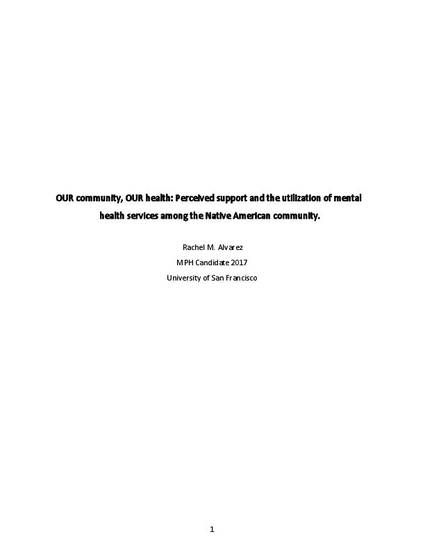
Other
USF Capstone paper: Master of Public Health
(2017)
Abstract
Even with the increase in access and affordability for mental health services, individual
utilization rates are still relatively low. This is especially true among AI/AN individuals, where
perceived support plays a large role in utilization, and generations of trauma equate to high
levels of mistrust. This project, which was funded by the Each Mind Matters (EMM)
organization and managed by the Sacramento Native American Health Center (SNAHC) looked
at the Sacramento community, and included a sample size (n=181) that was made up of nearly
50% self-identifying AI/AN persons. Participants were asked to complete a survey that explored
perceived support, comfort and understanding of mental health conditions, and barriers to
seeking services. The survey also had a subset of questions specifically for SNAHC patients.
Results showed that most participants had, directly or indirectly, heard a person afflicted with a
mental health condition be called “crazy,” and some participants felt uncomfortable after
finding out that someone had a mental health condition. Additionally, most participants
indicated that although they were not currently receiving services for themselves, they would
use them or refer a loved one if they noticed a decline in mental health. Lastly, most
participants felt that they could recognize mental health warning signs, but fewer felt
comfortable broaching the topic with the affected person. The need for greater research,
programming, and policy change is apparent. Research exploring the level of understanding
around mental health warning signs is needed, especially among service providers at SNAHC.
These research results could provide the justification for adding or modifying current patient
and provider programming, including the potential addition of a patient-focused Mental Health
First Aid training or peer-to-peer educational program. Lastly, with transportation being the
primary barrier for SNAHC patients receiving mental health services, establishing a partnership
with a rideshare company should be considered.
Disciplines
Publication Date
Winter December 6, 2017
Citation Information
Rachel Alvarez. "USF Capstone paper: Master of Public Health" (2017) Available at: http://works.bepress.com/rachel-m-alvarez/1/